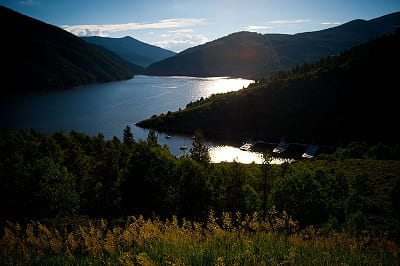Aspen is now entirely powered by renewable energy
September 21, 2015Aspen has become third U.S. city to achieve 100% renewable power.
The well-known small American city, located in the beautiful Rocky Mountain’s of Colorado, famed for its skiing, has recently gained attention for its notable achievement in obtaining all its power from renewable energy sources. It is the third city in the United States to fully rely on renewables, following in the footsteps of the 100% renewable powered American cities, Burlington, Vermont, and Greensburg, Kansas.
Aspen obtains its power from a variety of renewable sources.
The city’s renewable power supply comes from several clean energy sources, including wind, solar, hydro, geothermal heat, and landfill gas. However, Aspen primarily receives the majority of its renewable energy from wind and hydroelectric.
The city is “powered by the forces of nature, predominantly water and wind with a touch of solar and landfill gas,” Aspen’s utilities and environmental initiative director, David Hornbacher, told The Aspen Times.
 The city obtains its wind energy from four wind farms in South Dakota and Nebraska, and also uses energy from Ruedi Reservoir, Maroon Creek, and Ridgway Reservoir, a hydropower facility located near Montrose.
The city obtains its wind energy from four wind farms in South Dakota and Nebraska, and also uses energy from Ruedi Reservoir, Maroon Creek, and Ridgway Reservoir, a hydropower facility located near Montrose.
An extraordinary drop in price in renewable energy made it possible for Aspen to make the switch to 100% renewables.
According to an article from Think Progress, the city’s announcement came after its decade-long efforts to make the switch to renewables. However, what made the shift to achieve 100% green power possible was the incredible decline in the cost of renewable power. In recent years, the cost of solar plummeted and is expected to drop even more in the future. Wind energy is also substantially cheaper now compared to its price only ten years ago.
Another bonus for Aspen was the new regulations implemented by the Obama administration, which helped to make fossil fuel power sources, like coal, less competitive. More than one third of coal plants in the United States have been closed in the past six years, and new carbon regulations could mean that no new coal plants will be built in the country.
Even though Aspen isn’t exactly the biggest city, with an estimated 6,600 people, it’s goal of achieving 100% renewable energy is still impressive. As Hornbacher said to The Aspen Times, “It was a very forward-thinking goal and truly remarkable achievement.” and that “We’ve demonstrated that it is possible.”

 With over 15 years of reporting hydrogen news, we are your premier source for the latest updates and insights in hydrogen and renewable energy.
With over 15 years of reporting hydrogen news, we are your premier source for the latest updates and insights in hydrogen and renewable energy.
What is impressive about Aspen going 100% renewable is that it uses a variety of clean energy options whereas Greensburg’s plan relies almost exclusively on wind power. I believe Aspen is a model for for the rest of the country and even for other cities around the world.
The thing that is NOT impressive about this is that Aspen is second only to Las Vegas in being a totally wasteful place, and completely unsustainable.
The lines and lines of private jets at the Pitkin County Airport ALONE negate any gains for the environment.
All the Ahi, and romaine lettuce trucked in from THOUSANDS of miles away.
The McMansions packed on the once pristine hillsides are only used a few weeks a year, but must be heated all winter…. and it’s not like you see many Smart Cars, oh no…. BIG BIG BIG SUV’s!
Saying that the City of Aspen is somehow impressive environmentally because the City PAYS HIGHER RATES…is like being impressed that Kirsty Allie skipped dessert ONCE. We all use electricity out of the SAME GRID… it is NOT POSSIBLE to send electricity from a specific wind field to a specific location. ASPEN gets THE SAME MIX AS EVERYONE ELSE…. MOSTLY COAL.
This is a Greenwash press release.